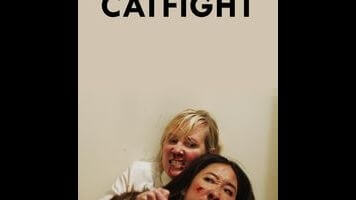Even when not throwing themselves into hand-to-hand combat, Oh and Heche own Catfight, rising above its general disdain for the wealthy, for artists, for people who buy art, for people who think art is stupid, for doctors, for New Age twits, for conspiracy nuts, and so forth. It’s the kind of movie where almost every character is some shade of awful, and where the savagery of the worldview clashes “amusingly” with the civility of polite society. (Writer-director Onur Tukel, making an undeniable leap forward in confidence and ambition after a series of smaller-scaled comedies, runs through a roll call of classical musicians, scoring venomous encounters to Mozart, Beethoven, Bach, Chopin, and so forth.) The movie plays like something Todd Solondz might write while on very strong cold medicine. Hence, perhaps, a two-scene cameo by Dylan Baker.
Catfight implies a kind of moral universe, where success spoils people absolutely and where what goes around always comes around, usually tenfold. Cruel twists of fate arrive periodically, beginning with Veronica’s discovery—after she awakens from the two-year coma her brawl with Ashley put her into—that she’s flat broke and her family is gone. Is the universe punishing her for how her husband made his fortune, profiting off a new war in the Middle East? Ashley, who becomes an art-world sensation, is casually accused of exploiting the country’s despair and hatred with her grotesque paintings—and it should come as no surprise that her fortunes don’t continue to skyrocket. Catfight capitalizes on the current climate in its own way: The movie’s dopiest touch is a phony-looking talk show all the characters watch, which Tukel uses to establish his alternate America, ruled by a new president with a destructive conservative agenda. Sound topical? Truthfully, Catfight’s stabs at political satire seem outdated and even quaint when compared to the real thing. (One character naming her trees Bernie, Hillary, and Donald doesn’t help.)
Whether any of this caustic humor lands will be a matter of sensibility; certainly, Tukel keeps the jokes coming hard and fast, sparing no one. But Catfight’s insistence on creating a perfect symmetry between its heroines’ shattered lives results in some lazy storytelling; when karma finally makes its way back around to Ashley, the repetition of circumstances mostly just reveals a lack of imagination. Still, at its most schematic, the film has two sharp, nuanced performances to lean on: Modulating their toxicity as the world humbles their characters hard, Oh and Heche inspire a few pangs of empathy, even as it becomes clear that they’re the mutual punchline of a long, sick joke. They stand bloodied and bruised, surviving the indignities Catfight gleefully sends their way.









![HBO teases new Euphoria, Larry David, and much more in 2026 sizzle reel [Updated]](https://img.pastemagazine.com/wp-content/avuploads/2025/12/12100344/MixCollage-12-Dec-2025-09-56-AM-9137.jpg)































